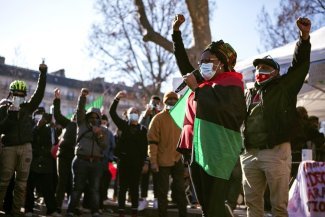Workers in Ireland are being asked to speak out about ethics in the workplace this month after President Michael D. Higgins called for an inquiry into the importance of ethics in business and society in response to the destructive impact of the economic crisis.
In response, the Irish Congress of Trade Unions (ICTU) launched a campaign and website asking Irish workers to explore what an ethical workplace means to them.
Speaking at the launch of the programmet in Dublin, the President strongly criticised trends towards the promotion of zero-hours contracts and other forms of insecure work, and said the effects of the “ongoing casualisation of labour on the quality of work and on the morale of workers are of comparable importance to endemic unemployment.”
In a statement sent to Equal Times from the President’s office, President Higgins said he was “delighted” by the launch of the initiative.
"Given Ireland’s recent history, which has seen working conditions change dramatically in connection with wider European and global trends, it is most timely to reassess what is meant, today, by decent work,” he stated.
“I congratulate ICTU on organising this important conversation that involves all of us, and I encourage as many people as possible across the island of Ireland to take part in the discourse to which they are invited.”
The central aim of the initiative, ICTU said, is to ensure that the voice of workers is heard.
Macdara Doyle, ICTU Communications Officer, told Equal Times that the question “what does an ethical workplace mean to you?” had intentionally been left “broad and open” to allow people to answer in any way they choose.
A film crew is collecting responses on video, and a dedicated website has been set up through which people can write a response of any length, post a picture, upload a video, or tweet using the #ethicswork hashtag.
“People can respond in a whole range of different ways,” said Doyle. “It’s interesting to see the level of engagement that’s coming back. People are responding, they are reacting, and it is triggering conversation in workplaces.”
“What’s important to us is not the number of responses but the range of diversity,” he continued.
“Hopefully we’ll be getting responses from all different sectors of the economy and with diversity in terms of gender, culture and race.”
Issues raised so far in responses include decent pay and working conditions, health and safety, and the right to join and be represented by a trade union.
Being able to speak up and have opinions respected at work is another priority for respondents, said Doyle.
“An ethical workplace means one where you can speak up and this is one of the things we’ve seen coming through already,” Doyle said.
The ICTU stressed the importance of ethics to Ireland’s economy.
“From our perspective, if you go back to the crash a couple of years ago, it was fundamentally to do with a lack of ethics in the workplace at a higher level that caused the problems we’re now seeing,” said Doyle.
Irish trade unions have been encouraging their members to get involved in the campaign and add their own voices to the conversation.
Teachers Union of Ireland (TUI) General Secretary John MacGabhann told Equal Times: “For TUI, an ethical workplace is one where all employees are treated equally with dignity and respect.”
“Conditions of service are enshrined, as is the right to union representation and collective bargaining. It is an environment where people feel secure, protected and supported in carrying out their daily duties.”
The President’s call for discussion of ethics at work came as part of a series of speeches inviting people across Ireland to explore the challenges of living ethically, in order to “collectively pursue a reflection on ethics” that the President hopes might become a catalyst for positive change.
The campaign will run until 31 March 2015, after which responses will be will be collected and presented to the President for his consideration.









